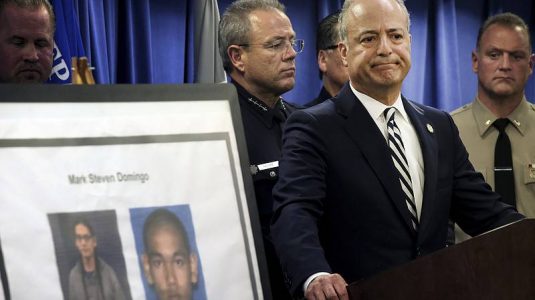
Former FBI agent explains how investigators track potential terror plots online
A common thread has been identified between Saturday’s shooting at a synagogue in Poway and the disrupted terror plot in Long Beach. FBI agents and LAPD officers arrested Mark Domingo, an Army veteran accused of plotting to detonate improvised explosive devices at a white nationalist rally in Long Beach. Authorities said the suspect posted a video online, professing his Muslim faith. In the video, the suspect said “America needs another Vegas event,” referencing a mass shooting that happened in Las Vegas in October 2017.
Retired San Diego FBI agent Darrel Foxworth joined KPBS reporter Priya Sridhar to talk about how online chat rooms and forums were utilized in the organization of terror plots.
Here are some of the highlights of that interview:
Q: Are law enforcement monitoring these chat rooms?
A: When you look at both of these cases, they appear to have some similarities. The first thing is that it appears that they’re both homegrown violent extremists. We’re talking about individuals who are self-radicalized through the Internet. And the problem with these cases, when you talk about these individuals, is that they’re very hard to detect. You don’t know when they’re going to go out and commit that violent act.
Q: How do you know when a threat that’s made online is actually a credible threat?
A: Yes. We always have to be aware of civil liberties. We have to be aware of freedom of speech. Sometimes we don’t like what people are saying. You may not like it. I may not like it. But the thing is, that may be covered under freedom of speech. Where it crosses the line is when you start talking about doing specific actions with that going out and doing something.
Q: We saw over the weekend this incident that happened in Poway. That’s under the jurisdiction of the San Diego Sheriff’s Department. Do those kinds of departments even have the resources to be monitoring extremist chat rooms or are they relying on their federal partners?
A: I served for over 30 years, and worked in a number of field offices and a number of different cities. I can tell you that, local law enforcement, they know their streets. They’re out there conducting patrols. They know the neighborhoods. They know the communities, so they have that expertise locally. It can’t be undervalued. Federal resources come in there. There’s technology, there are resources, that the FBI and other federal agencies may bring in. And you bring that together in this task force setting and you maximize your efforts.
Source: KPBS





